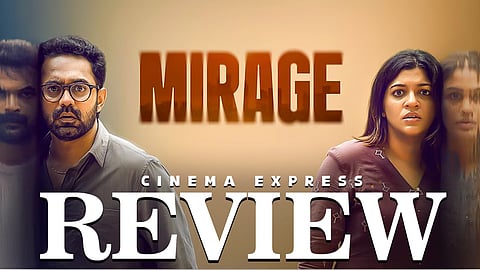Mirage Movie Review: A thriller that twists itself into tedium
Mirage(2 / 5)
Mirage Movie Review:
Jeethu Joseph’s greatest strength has always been his ability to stay a step or two ahead of the audience, crafting thrillers that feel smart and logical. Though he has succeeded in other genres, it’s in thrillers that he truly thrives. With Mirage, the director returns to familiar territory, but not with his usual assurance. The film seems consumed by its obsession with twists. In the final stretch, a barrage of reveals is hurled at us; a few might surprise momentarily, but they rarely feel earned. What makes a Jeethu Joseph twist memorable is not the jolt itself, but the careful build-up that precedes it. Mirage, unfortunately, seldom offers that organic progression, relying instead on an overload of shocks that ultimately dilute their impact.
Director: Jeethu Joseph
Cast: Asif Ali, Aparna Balamurali, Hakim Shahjahan
Abhirami (Aparna Balamurali) is left in a quandary after her boyfriend Kiran (Hakim Shahjahan) goes missing with some sensitive information about their workplace, a shady financial consultancy. The company's men and cops are after Abhirami to find information about Kiran and the data with him. With the help of Ashwin (Asif Ali), an online investigative journalist, she tries to unravel the mystery around Kiran.
Srinivasan Abrol and Jeethu Joseph's screenplay treads familiar routes, with a brief flashback on Kiran-Abhirami's relationship—which a policeman in the film aptly defines as a 'cliche cinema kadha'—before focusing on Abhirami and Ashwin's efforts to find the missing links of the puzzle that Kiran is. In between, there's space for all the typical mystery thriller tropes like red herrings and betrayals, but the film expects more from us. Or at least, that's what Vishnu Shyam's music suggests. Each new finding—some of which could be guessed from miles away—is accompanied by an annoyingly rousing background score that forces us to feel the moment.
After a rather uninteresting first half, Mirage picks up pace when newer characters get introduced and the existing ones are stripped off to expose their true colours. This is also where the title, 'Mirage', and the tagline, 'Fades as you get closer', hold significance. But like most Jeethu Joseph films, a lot of this crucial information is revealed through dialogues, severely weakening the impact. His liking for over-exposition and 'telling rather than showing' disrupts the flow, often causing confusion. If you don't pay close attention, you might end up perplexed with all the Abhiramis, Ashwins, and Ananthus. Although the script is verbose, the dialogues are still not sharp enough. And with a generous dose of forced English at play, some of the lines come across as unintentionally funny. Editor Vinayakh packages the film at such breakneck speed, especially in the second half, that there's very little breathing space to pause and reflect. It's perhaps a conscious choice to mask the flaws, but what it does is take away the viewer's participation in storytelling. The twists that are supposed to be exciting end up exhausting us.
For the most part, Mirage looks like the story of a damsel in distress, with Asif's Ashwin as the saviour. But to their credit, the makers manage to subvert it and extend some agency to Aparna's character. However, the actor, apart from a physically strenuous stretch in the climax, fails to register an impression. It is also towards the end that Asif Ali, who had to hold back until then, gets a space to really perform. The raw action choreography in the climax is not something we usually see from a 'family-friendly' director like Jeethu, and points to the actors for making the violent scuffle feel real. However, the same cannot be said about the other two action scenes—one in the forest and the other, a shootout at a restaurant—which both feature old-school staging and choreography where the camera starts moving towards the object well before it's shattered by the bullet. And let's not talk about the tacky VFX employed to capture the remnants of a derailed train. Jeethu has had this fascination for ambitious VFX shots, right from his Memories and Oozham days, but the finesse still seems lacking.
At one point, Asif Ali's character quotes Gandhi's famous lines, "To lose patience is to lose the battle." With Mirage, where the best is saved for the very last, you need patience and a lot more.

